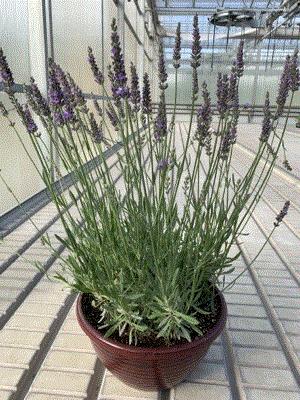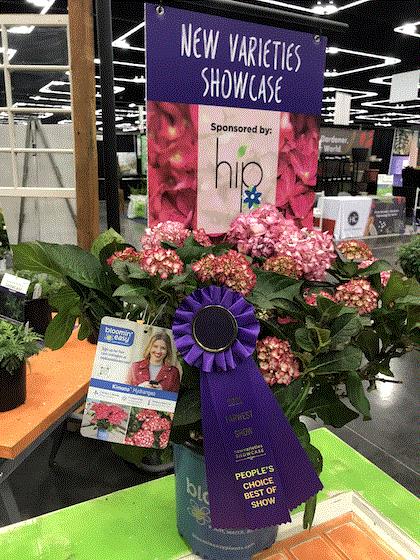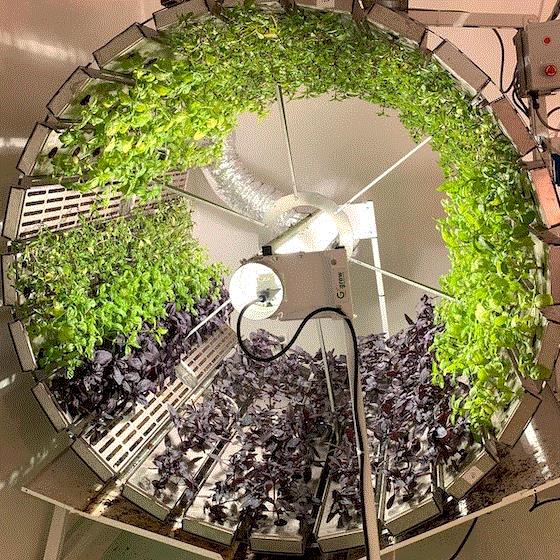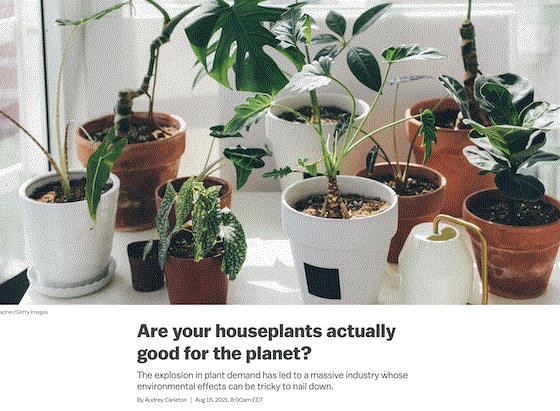Chlorpyrifos banned … does it matter?
I don't like to see our industry lose a pesticide, but in this case, chlorpyrifos has been targeted by the Environmental Protection Agency for a long time (residential use was banned in 2000), so it was no surprise the EPA issued a final rule on Wednesday banning the broad-spectrum insecticide on all food crops. Long-term exposure to the organophosphate has been linked to nervous system effects, especially in children. California beat the Feds to the punch in 2019.
But that’s food crops. What about ornamentals? I asked several of my pesticide expert friends and colleagues for some insights. Steve Larson, Nursery & Greenhouse Crop Specialist for Bayer, offered up a detailed analysis of chlorpyrifos and said I could share it:
Chlorpyrifos is still sold in nursery crops (as Dursban from Corteva, formerly Dow) and in nursery and greenhouse (as DuraGuard from BASF). There is a generic version, Chlorpyrifos 4E AG, manufactured by Adama, that is approved for treating nursery stock for fire ants to satisfy USDA quarantine requirements. All forms or chlorpyrifos are labeled Restricted Use and carry a 24-hour REI. One of the main draws for chlorpyrifos is its low cost.
The Dursban product is labeled for use in nursery crops only, not greenhouses, and the Restricted Use language, along with a 24-hour REI, limits use with many growers. I just don’t see it being used that much.
DuraGuard is a micro encapsulated formulation that is still used by nursery and greenhouse growers. It is an effective treatment for fungus gnat and shore fly larvae in soil media in potted greenhouse crops. Again, the Restricted Use designation and 24-hour REI might limit use with some growers.
Honestly, I do not know the fate of chlorpyrifos for nursery and greenhouse use. Often, when a chemical is banned for use in large food crop markets, companies find it difficult to justify supporting a chemical for use in the smaller, niche markets like ornamentals. The costs of keeping federal and state registrations current can be expensive, and it usually comes down to a business decision. That’s just my opinion based on my years in the business.
Fortunately for growers, there are several effective chemical and biological substitute insecticide options available.
Thanks, Steve! Corteva has already announced they were stopping production of chlorpyrifos by the end of 2020, so that’s one source that’s gone away.
Still, Dr. Ray Cloyd, extension entomologist with Kansas State University, adds that more and more growers have switched away from the organophosphate chemistry.
“We’re using more of the pyrethremoids now,” he says. “I think at this point, the loss of chlorpyrifos in the horticulture industry probably will have a negligible impact. I don’t think anyone will even notice.”
That’s Steve and Ray’s views, but what about you? Anyone still using chlorpyriphos, and if so, are you looking for alternatives? Weigh in HERE.

Green Circle announces major expansion
Two hundred and fifty new jobs and 30 acres of new greenhouse—that’s how Green Circle Growers is describing a planned expansion—the largest in company history, they added. The news came via press release on August 23.
“The expansion will drive sales through an improved customer experience and accommodate our vision to have a Green Circle Growers’ plant in the line of sight of every consumer in North America,” said C.J. van Wingerden, co-CEO of the Oberlin, Ohio, business.
According to the release, the 3 1/2-year project includes a substantial investment in expansion of the main campus office, a new distribution center and major infrastructure upgrades.
“The growth will result in more than 250 new jobs, many of which will be at the executive level, including a mix of operations, IT, senior leadership, administrative, management and more, bringing our total local workforce to over 1,150,” C.J. added.
The jobs will be at Green Circle Growers and their related companies, Express Seed and Fresh2U Transportation & Logistics.

The planned office expansion will double their capacity and prepare them for further growth.
I asked C.J. via email to share a few details about the project, specifically the 30 acres of greenhouse space (which will bring their total greenhouse capacity to 150 acres).
“The demand for green and flowering plants has increased, and this 30-acre expansion will help us meet our customers’ needs,” he replied. “Our team has worked closely with the experts at AgriNomix, Prins and Zwart to help create the exact structure we need to finish both indoor and outdoor plants. This sustainable and automated greenhouse, combined with our amazing team, will allow us to compete in the floriculture market for years to come.”
C.J. says they'll open 7 or 8 acres of the greenhouse every three months for the next year.

Lavender, Hydrangea take prizes at Farwest
Alas, I was NOT at last week’s Farwest Show in Portland, but Managing Editor Jen Zurko was, along with astute woody expert Professor Matthew Chappell of Nursery & Landscape Insider fame, and Jen has promised to write up some highlights for me to share in the next Acres Online (I’m sure Matthew will have his own highlights as well).
For now, two bits of plant-related news:
Out of all the entries in Farwest’s New Varieties Showcase, Lavender Sensational! (Lavandula intermedia ‘Tesseract’ PP31786) was named Best in Show. Sensational! was discovered by Lloyd and Candy Traven of Peace Tree Farms and Richard Grazzini of Garden Genetics. It’s represented by Concept Plants and the specimen entered in the New Varieties Showcase was grown by licensee Walla Walla Nursery.

And from Van Belle Nursery: Their Bloomin’ Easy brand took home the People’s Choice “Best in Show” award for Kimono Hydrangea, a compact, reblooming Hydrangea macrophylla featuring dark foliage topped with blooms of delicate white and pink inside wine-red margins on each floret.

“We knew Kimono would turn heads around the industry, and it’s so great to see this beauty connect with people and win Best in Show,” says Brand Manager DeVonne Friesen.

Six Bloomin’ Easy intros
While we’re on the topic of Bloomin’ Easy, which is Van Belle’s brand aimed at young homeowners (“exceptional beauty and color … that are more resilient and lower maintenance”), here are six additions to the brand:
(Above) Torch Panicle Hydrangea, the earliest to flower they’ve seen, they say; and Cherry-Go-Round Bigleaf Hydrangea, a heavy rebloomer with cherry-red flowers.
(Above) Frill Ride Bigleaf Hydrangea, with unique frilly red florets combined with heavy reblooming; and Pearl Potion Dwarf Korean Lilac, offering fragrant pearl-white flowers.
(Above) Peach Kisses Weigela, featuring reblooming peachy pink flowers and a tidy form; and Pink Dynamo Mountain Hydrangea, with “the most stunning combo of rich pink flowers, dark foliage and compact form we’ve seen,” they say.
For information on how to grow or retail these plants, contact Bloomin’ Easy Marketing Manager Kevin Cramer at kevin@bloomineasyplants.com.
Register for AmericanHort’s Finished Plant Conference
Your industry trade association, AmericanHort, is inviting all business owners, managers, growers, students and—well, heck, everybody in the plant business!—to sign up for this fall’s AmericanHort Finished Plant Conference, to be held in Grand Rapids, Michigan. It promises to be THE event for finishing growers of bedding and potted flowering plants, indoor and outdoor perennials, and fast-turn flowering shrubs. With a grower-focused trade show, greenhouse tour, perennial workshop, and more than 25 educational sessions for all expertise levels, you won’t want to miss out!

As for details:
The educational tracks will cover three areas:
Production Practices. These sessions will focus on best practices in production that will help growers keep quality front-and-center while increasing efficiency and ROI.
Crop Talks. The Crop Talk education sessions will focus on optimizing growing practices for specific crops, crop groups and systems.
Grower-to-Grower Panels. These will be moderated panels of expert growers. Hearing strategies and troubleshooting with other finished plant growers, suppliers and researchers is one of the best ways for the horticulture industry, and your business, to grow.
The Greenhouse Tour will get you an inside look at four operations: Walters Gardens, Spring Meadow, Masterpiece Flower Company and Garden Crossings. You’ll gain expertise in bedding, fast-turn flowering shrubs, perennials, production technology, pest control and much more.
The half-day Perennial Workshop at Walters Gardens is aimed at the beginning and intermediate perennial grower.
For all the details, and registration information, go to www.americanhort.org/events/finished-plant-conference-2021.

This item is just for you Quaker State growers
Pennsylvania growers can earn PA Department of Ag pesticide recertification credits with the help of 13 low-cost ($10) webinars that provide the core and category credits green industry professionals need to maintain a Pennsylvania pesticide applicator license.
Participants watch the webinar, then take a short online quiz. At the end of the quiz, you'll receive your score, which is recorded and submitted to PDA. (If you do not achieve the minimum score needed to pass, you may re-watch the sessions and re-take the quiz as many times as needed.)
Registration is required to receive the webinar and quiz links.
The “Green Industry Updates” are only available until October 31.
Registration and other details on the webinar agendas, pesticide credits and speakers can be found at https://extension.psu.edu/green-industry-update-webinar.
Vita Farms, ForemostCo Inc. partner on new TC lab
Vita Farms, ForemostCo Inc.’s partner in Guatemala, has just announced the opening of Vita Labs, a new tissue culture lab to “create consistent quality and availability to better serve our customers’ evolving needs,” said the press release.
The new lab is an 8,000 sq. ft. state-of-the-art facility with the capacity to produce 15 million young plants annually when the space is fully utilized. Additional expansion is planned over the next three to five years to further expand its capacity. Vita Labs’ key focus will be on ornamental plants, with over 110 varieties currently in-house.

“Vita Farms ships more than 200 million cuttings a year to the United States, Canada and Europe; our goal is to always have the best quality product on the market,” said Luis Pacheco, General Manager of Vita Farms. “There is no doubt that the current market demands we continue to improve and develop our production capabilities. Vita Labs will certainly help us do just that by producing high quality, uniform planting material that can be multiplied on a year-round basis under disease-free conditions.”
Vita Farms is a 50-acre nursery near Villa Canales, Guatemala, with 105 greenhouses and counting. In 2017, they purchased an additional 185 acres. The farm is managed by Luis Pacheco.

Should we be selling invasives?
Hooboy, did I just open a can o’ worms by asking that!
I was prompted by a Smithsonian Magazine article circulating amongst us editors titled “‘World’s Worst Invasive Weed’ Sold at Many U.S. Garden Centers.”
Not the sort of publicity we need.
The invasive weed in question is Imperata cylindrica, commonly called cogongrass, is generally sold under the common name Japanese Blood Grass and the cultivar I. cylindrica var. Rubra, better known as Red Baron (which is the specific variety I found listed online most often).
(The Smithsonian headline writer took some liberties: the article states that I. cylindrica is only “one of the world’s worst invasive weeds,” not THE worst as the headline says.)
Still, the article states that, despite being banned by federal legislation, the plant is still be sold at retail, along with some 1,300 other invasives.
I’m not all that knowledgeable about grasses or perennials, so I asked the feller who is: Paul Pilon, author and editor of our Perennial Pulse newsletter. Replied Paul:
“This Imperata is on the invasive lists for some states, but is commonly grown by many nurseries. In the Midwest, I’ve not found it to be invasive, but apparently in some parts of the country, like the southeast, it can be invasive.
“Red Baron is not sterile and does produce fertile seeds. I like this grass as an ornamental, but with its invasiveness it should not be produced or sold in some states.”
Thanks, Paul!
Any other perennial/grass experts want to weigh in? What's your view of the industry’s role in policing itself in regards to the plants we sell and their possible effects on the environment? Weigh in HERE.

HRI to Offer $25,000 in scholarships
Attention, students! The Horticultural Research Institute (HRI) will grant up more than $25,000 in scholarships for the 21-22 school year, and you’ve got until September 10 to claim your share!
These scholarships are made possible by nine endowed funds that aid students who are seeking a lifelong career in horticulture. HRI and its donor firms consider graduating students in horticulture to be the lifeblood of the green industry. Here are the nine, with the details about who's qualified to apply:
- The Timothy S. and Palmer W. Bigelow Jr. Scholarship is awarded to a student who is a resident of New England
-The Usrey Family Scholarship is awarded to a student attending a school in California
- The Bryan A. Champion Memorial Scholarship is awarded to a student attending a school in Ohio
- The Susie & Bruce Usrey Scholarship is awarded to a student attending a school in California
-The Spring Meadow Scholarship is awarded to students who are interested in a career in woody plant propagation, production or breeding
- The Mugget Scholarship is awarded to a student who plans to work in any aspect of the horticultural industry
- The Carville M. Akehurst Memorial Scholarship is awarded to a student who is a resident of Maryland, Virginia or West Virginia
- The Gunter Mecking Memorial Scholarship is awarded to a student who plans to work in any aspect of the horticultural industry
- The Wright Family of Alabama Scholarship is awarded to a student who plans to work in the horticultural industry, with preference given to Alabama students pursuing greenhouse careers
Scholarship applications can be accessed on HRI’s website at www.hriresearch.org/scholarship-application-and-resources.
HRI, the research affiliate of AmericanHort, has provided over $9 million in funds since 1962 to research projects covering a broad range of production, environmental and business issues important to the green industry. Over $14 million is committed to the endowment by individuals, corporations and associations. For more information about HRI, its grant-funded research, scholarships or programming, visit www.hriresearch.org.

Vertical farming gets even weirder
Except for certain locations like Antarctica and Mars, I’m a skeptic about growing vegetables in vertical stacks in warehouses—so-called vertical farming. Greenhouses are so much more efficient and proven. Now, a Montreal firm called Gigrow (Gravity Injection Growing) has given me even more reason to raise an eyebrow and express doubts as to their sanity. They’ve taken the plants off the benches and set them to spinning inside rotating cylinders reminiscent of a space station.

Why? I mean, really, why?
Well, they claim that by turning a flat bench into a cylinder with a light in the middle they can save four times the space and 3.5 times the lighting of a regular bench system. They also talk about how the irrigation is better and the environment is better and the carbon footprint is lower, etc. etc. … the typical hyperbole used by every alternative agriculture startup trying to raise startup capital.
The math only works if you compare one cylinder to one flat bench. If you stack benches, as is done in vertical farming, you lose the space benefits. And what about labor, efficiency, pest management … truly, it looks pretty wacky. The only place I’ve seen rotating plant growth systems used effectively is in tissue culture, where you don’t want the plant to know which was is up or down.
And yet Gigrow is about to build a greens production facility, the Gigrow Urban Farm (“Fermes Urbaines”) in Varennes, Quebec, Canada. It’s a $13 million, 24,000 sq. ft. urban agriculture project, one of Quebec’s largest. They say they’ll produce up to four million heads of lettuce a year. Here's how they describe it:
“The cultivation process is carried out inside a rotating horizontal injection roller, which operates by gravity. The system only uses the exact amount of water and fertilizer needed for optimum production. This patented injection device enables significant energy and space savings, as well as accelerates the growth process by precisely controlling temperature and humidity. In addition, this new agricultural technique makes it possible to cultivate a wide variety of vegetables, herbs and even flowers indoors. Thus, we can ensure a diversified food production, which changes according to the seasons without it being subjected to climatic vagaries.”
Right.
Anyway, if you want a chuckle, HERE is the press release. And HERE is a hip video about it. You tell me if it’s brilliance or madness or a clever way to raise venture capital at beytes@growertalks.com.

June 22 is Darwin Perennials Day 2022
Darwin Perennials brings back its in-person event on Wednesday, June 22 to showcase the latest introductions and educate perennial plant producers in The Gardens at Ball.
June 22, ’22. That’s easy to remember!
It’s been two years since Darwin was able to host an in-person event, so it will be a welcome opportunity to see loads of new and popular perennials growing and overwintering in Zone 5. You’ll have a chance to meet with top suppliers and on-site experts to source products and expand your perennial growing knowledge.
Sign up for the Darwin Perennials blog at darwinperennials.com/blog to get up-to-date news and information on the latest plants and programs that make your business a success.
And don’t forget that you can still access all the information and videos that Darwin posted this summer at their “Darwin Perennials University.” Find that HERE. (The videos are particularly awesome; I know because I helped produce them.)
Sometimes I don’t care for my fellow "journalists"
Nearly every Mother’s Day, somebody has to write a hit piece against flowers, generally focusing on chemicals and water use and carbon footprint and labor abuses in South America.
Now our beloved and trendy houseplants are the target, thanks to the rabble-rousers at the website Vox, which decided to find an evil side of the houseplant craze. To do so, they took industry stats out of context and labeled our largest houseplant growers “industrial farms” that “deploy large volumes of water,” use “massive swaths of land” and “control growth via strict heat and lighting conditions.” Oh, did you know we grow in “harsh, mass-produced soils”?
How dare us!

All in all, it’s a one-sided hit piece in which the writer obviously had an agenda before she ever picked up the phone. I’m sharing it only so you’ll know that, no matter how green we think we are, somebody will find a way to take us down. As the author concludes, ominously, “the future of household foliage could look red, purple or even pink. It might not look very green.”
Good grief!

Finally ...
You ever see something with your name on it and wonder if one of your ancestors could have been involved in whatever it is? Senior/Digital Editor Bill Calkins knows that Calkins Road, which runs right beside Four Star Greenhouses in Carleton, Michigan, is named for Calkins’ Farm, owned by Bill’s great (1904-1979) and great-great (1881-1956) and maybe even great-great-great (1839-1921) grandfathers (Homer, Amherst and Orrin, respectively).

Bill is pretty sure it was a truck farm, of which there were many in Michigan back in the day, and eventually a gas station stood out front. Today, it’s still a lot of farmland, along with the very nice greenhouses of Four Star.
Bill wishes it was all his. Or at least the sign.
See you next time!

Chris Beytes
Editor
GrowerTalks and Green Profit
This e-mail received by 25,158 loyal readers!
Thanks to my loyal sponsors, who help me reach the 25,158 readers of Acres Online in 66 countries. Want to be one of them (a sponsor, that is)? Give Paul Black a shout and he'll hook you up.